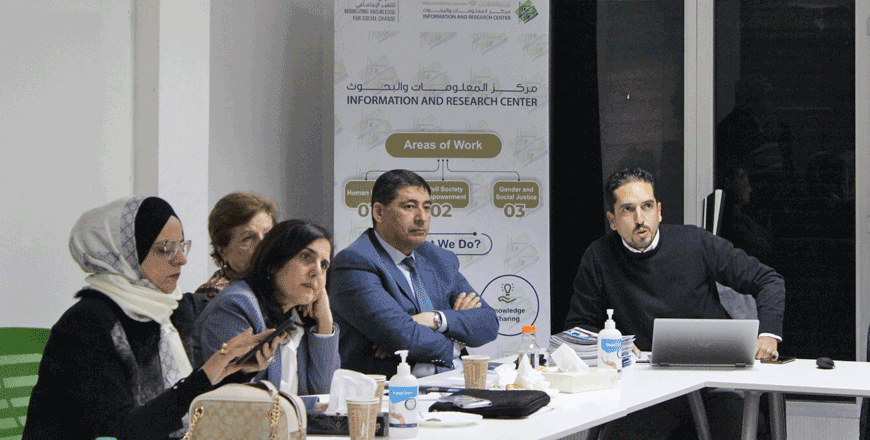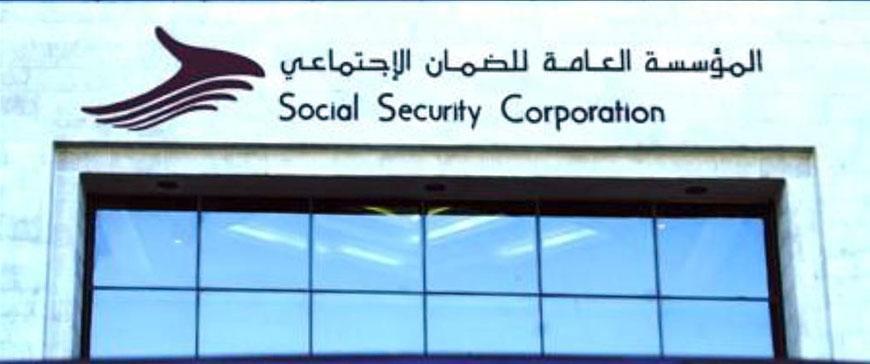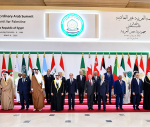You are here
Maternity insurance could improve women’s workforce participation, says IRCKHF roundtable
By Maria Weldali - Feb 14,2023 - Last updated at Feb 16,2023

Speakers during a roundtable organised by the Information and Research Centre of the King Hussein Foundation on Tuesday (Photo courtesy of IRCKHF)
AMMAN — The Information and Research Centre of the King Hussein Foundation (IRCKHF), on Tuesday held a roundtable session to generate recommendations for strengthening the Social Security Corporation’s (SSC) maternity insurance.
The session, which was mainly attend by labour market experts and representatives from national institutions and human rights organisations, discussed current levels of women’s participation in the local labour market, labour legislation and the extent to which current legislation provides the required maternity protections for women in the workforce.
During the session, IRCKHF Director Ayman Halaseh provided a brief presentation of some of the centre’s latest studies, details of Article 6 of the Constitution, which stipulates that all Jordanians are equal before the law and that the government will ensure equal opportunities to all Jordanians, in addition to discussing SSC Article 44.
According to SSC’s paragraph 1 of Article 44, which follows the Jordanian Labour Law, female workers must be granted paid maternity leave, provided she has a social insurance record of no less than six successive months through their work in the private sector. However, the IRCKHF, through interviews with human resources professionals in the private sector, has reached the conclusion that this same article restricts women’s participation in the labour market.
Additionally, the amended draft law, which added the following phrase: “the paid maternity leave is granted provided that the subscriber has eight consecutive or intermittent subscriptions during the year preceding their maternity entitlement,” still places restrictions on women’s labour participation.
On the same note, Hamada Abu Najma, who is head of the Jordanian Labour Rights Centre “Workers House”, said that it is “imperative” to include healthcare benefits for the mother and child, and expenses of any postpartum complications and illnesses should be paid by maternity insurance.
According to Abu Najma, around 80,000 women have benefitted from the SSC’s maternity insurance programme out of 290,000 female subscribers.
“Maternity insurance programmes were found to provide social protection and are not to ensure cash security,” he added.
For her part, Gender Technical Specialist of the International Labour Organisation’s (ILO) Regional Office for Arab States, Reem Aslan, stated that “the SSC does not get its sources of funding from the government, which makes it a financial institution that depends on monthly subscriptions”.
“Therefore, at this point the focus must be on how to formulate the forthcoming recommendations in a clear and suitable way for Jordan,” she said.
Women’s labour force participation in the Arab region averages at around 21 per cent, but in Jordan, the percentage is lower, despite the constitutional support for women’s economic participation, said legal adviser for the Jordanian National Commission for Women (JNCW), Amal Haddadin.
In conclusion, the session’s recommendations included having a minimum maternity leave period of 14 weeks that ensures adequate recovery, or the equal allocation of a 90-day leave for women working in public and private sectors.
Further, some experts during the session noted that working women who have SSC subscriptions should benefit from the maternity insurance, regardless of the number of their subscriptions while having established safeguards in place. Others called for adding a paragraph to Article 44, which would set a minimum number of subsections to benefit from the maternity insurance programme.
Related Articles
AMMAN — Throughout 2021, a total of 11,000 women in Jordan benefitted from the Social Security Corporation’s (SSC) maternity insurance, tota
AMMAN — Amendments to the Social Security Law, which went into effect after being published in the Official Gazette on October 1, aim at enh
AMMAN – The Social Security Corporation (SSC) on Monday said the number of women who benefited from maternity insurance during the first fou
















